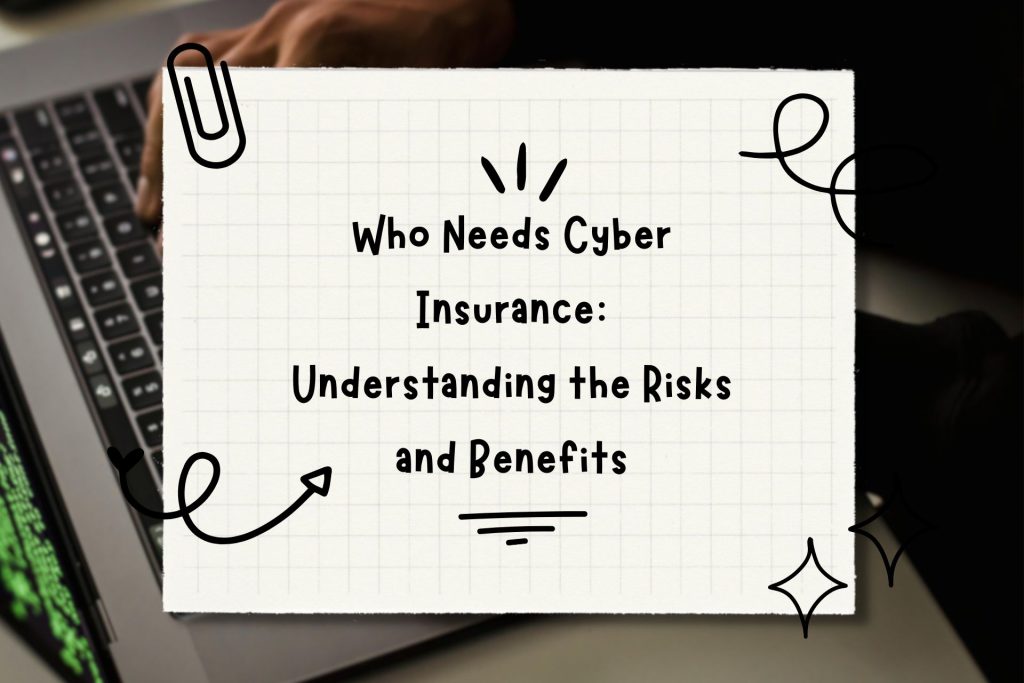Cybersecurity threats have become increasingly prevalent in recent years, and businesses of all sizes are at risk.
These threats can lead to substantial financial setbacks, harm a company’s reputation, and even result in legal repercussions. Consequently, many businesses are turning to cyber insurance as a means of shielding themselves from these perils.
Cyber insurance is crafted to furnish financial protection to businesses in the event of a cyber attack or data breach. It serves to defray the costs linked to investigating and mitigating the impact of a breach, along with any legal fees or damages that may ensue.
While cyber insurance holds significant value for businesses, it’s imperative to comprehend who requires it and why.
What Is Cyber Insurance?
Cyber insurance is a type of insurance policy that provides coverage against losses caused by cyber attacks or data breaches. These policies typically cover a range of expenses associated with a cyber incident, such as legal fees, notification costs, data restoration expenses, and business interruption losses.
Who Is at Risk?
Any organization that uses technology to store or process sensitive information is at risk of a cyber attack. This includes businesses of all sizes, government agencies, non-profits, and educational institutions. Small and medium-sized businesses are particularly vulnerable, as they often lack the resources to implement robust cybersecurity measures.
Key Components of Cyber Insurance Policies

Cyber insurance policies typically include several key components, including:
- Data Breach Coverage: This covers the costs associated with a data breach, such as notification expenses, credit monitoring for affected individuals, and forensic investigations to determine the cause of the breach.
- Cyber Liability Coverage: This covers the costs associated with a cyber attack, such as legal fees, damages resulting from lawsuits, and regulatory fines.
- Business Interruption Coverage: This covers losses resulting from a cyber attack that causes a business to temporarily shut down or lose revenue.
- Crisis Management Coverage: This covers the costs associated with managing a cyber incident, such as public relations expenses and crisis management consulting fees.
Overall, cyber insurance can provide valuable protection for organizations of all sizes that face the risk of a cyber attack. By understanding the key components of cyber insurance policies, organizations can make informed decisions about the type and amount of coverage they need to adequately protect themselves against cyber threats.
Businesses and Cyber Insurance
Cyber threats are a growing concern for businesses of all sizes, and cyber insurance can provide a safety net for those who fall victim to a cyber attack. While cyber insurance is not a one-size-fits-all solution, it can help mitigate the financial and reputational damage that can result from a breach.
Small and Medium-Sized Enterprises (SMEs)
Small and medium-sized enterprises (SMEs) are particularly vulnerable to cyber attacks due to their limited resources and lack of in-house IT expertise. According to a study by the Ponemon Institute, 58% of SMEs experienced a data breach in 2018. Cyber insurance can help SMEs recover from a breach by covering costs such as legal fees, notification expenses, and credit monitoring for affected customers.
Large Corporations
Large corporations are also at risk of cyber attacks, but they often have more robust IT departments and security measures in place. However, even with these measures, breaches can still occur. Cyber insurance can provide additional protection for large corporations by covering costs such as business interruption, data recovery, and reputational damage.
E-Commerce Businesses
E-commerce businesses are particularly vulnerable to cyber attacks due to the sensitive customer data they handle. Cyber insurance can help protect these businesses from the financial fallout of a breach, including costs such as credit monitoring, legal fees, and lost revenue due to business interruption.
Overall, businesses of all sizes and industries can benefit from cyber insurance. It can provide a safety net in the event of a breach and help businesses recover from the financial and reputational damage that can result.
Individuals and Cyber Insurance
Cyber insurance is not just for businesses. Individuals who use technology in their daily lives can also benefit from having cyber insurance. Here are some examples of individuals who may need cyber insurance:
Freelancers and Contractors
Freelancers and contractors often work with sensitive client data, such as financial information or personal details. If this data is compromised, it can lead to legal action and damage to their reputation. Cyber insurance can help cover the costs of legal fees and any damages awarded to the affected parties.
Remote Workers
Remote workers are often more vulnerable to cyber attacks as they may use public Wi-Fi networks or personal devices to access company data. Cyber insurance can help cover the costs of any data breaches or cyber attacks that occur while working remotely.
High-Net-Worth Individuals
High-net-worth individuals may be at a higher risk of cyber attacks due to their wealth and status. Cyber criminals may target them for financial gain or to gain access to their personal information. Cyber insurance can help cover the costs of any damages resulting from cyber attacks.
In conclusion, cyber insurance is not just for businesses. Individuals who use technology in their daily lives can also benefit from having cyber insurance. Freelancers and contractors, remote workers, and high-net-worth individuals are just a few examples of individuals who may need cyber insurance.
Specific Industries
Healthcare Providers
Healthcare providers are one of the primary targets for cyber-attacks due to the vast amount of sensitive data they hold. Cybercriminals target healthcare institutions to obtain personal information such as social security numbers, medical records, and insurance information. A cyber-attack on a healthcare institution can cause significant financial losses and damage to the institution’s reputation.
Cyber insurance can help healthcare providers cover the costs associated with a cyber-attack, including legal fees, data recovery, and notification costs. It can also provide coverage for business interruption losses, which can be significant in the healthcare industry.
Financial Institutions
Financial institutions are another prime target for cyber-attacks due to the sensitive financial information they hold. Cybercriminals target financial institutions to obtain personal information such as bank account numbers, credit card information, and social security numbers. A cyber-attack on a financial institution can cause significant financial losses and damage to the institution’s reputation.
Cyber insurance can help financial institutions cover the costs associated with a cyber-attack, including legal fees, data recovery, and notification costs. It can also provide coverage for business interruption losses, which can be significant in the financial industry.
Education Sector
The education sector is also vulnerable to cyber-attacks due to the vast amount of sensitive data they hold, including personal information, financial information, and research data. Cybercriminals target educational institutions to obtain personal information such as social security numbers, student records, and financial aid information. A cyber-attack on an educational institution can cause significant financial losses and damage to the institution’s reputation.
Cyber insurance can help educational institutions cover the costs associated with a cyber-attack, including legal fees, data recovery, and notification costs. It can also provide coverage for business interruption losses, which can be significant in the education sector.
Evaluating Cyber Insurance Needs
When considering whether to purchase cyber insurance, it is important to evaluate your organization’s specific cyber risks and insurance needs. This section will outline some key factors to consider when assessing your cyber insurance needs.
Risk Assessment
The first step in evaluating cyber insurance needs is to conduct a thorough risk assessment. This involves identifying the types of cyber risks your organization faces, as well as the potential impact of a cyber incident on your business operations, finances, and reputation.
Some common cyber risks include data breaches, cyber attacks, and system failures. It is important to assess the likelihood of these risks occurring and the potential costs associated with each type of incident.
Coverage Scope
Once you have identified your organization’s cyber risks, you can evaluate the scope of coverage needed in a cyber insurance policy. Cyber insurance policies can vary widely in terms of coverage, so it is important to carefully review policy terms and conditions.
Some common types of coverage offered by cyber insurance policies include data breach response, network security liability, and cyber extortion. It is important to consider which types of coverage are most relevant to your organization’s specific cyber risks.
Cost-Benefit Analysis
Finally, when evaluating cyber insurance needs, it is important to conduct a cost-benefit analysis. This involves weighing the potential costs of a cyber incident against the costs of purchasing a cyber insurance policy.
While cyber insurance can be expensive, the potential costs of a cyber incident can be even greater. By purchasing a cyber insurance policy, organizations can transfer some of the financial risk of a cyber incident to the insurance company.
Overall, evaluating cyber insurance needs requires a careful assessment of an organization’s specific cyber risks, coverage needs, and financial considerations. By taking these factors into account, organizations can make informed decisions about whether to purchase cyber insurance and which policy to choose.
Cyber Insurance Providers
Specialist Insurers
There are a number of specialist insurers that offer cyber insurance policies. These companies focus solely on cyber insurance and have a deep understanding of the risks and threats associated with cyber attacks. They offer policies that are tailored specifically to the needs of businesses that operate in the digital space. Some of the leading specialist insurers include:
- Chubb
- AIG
- Hiscox
- Beazley
- CNA
These companies offer a range of policies, including first-party coverage for losses sustained by the insured, third-party coverage for liability to others, and coverage for regulatory fines and penalties.
Traditional Insurance Companies
Many traditional insurance companies also offer cyber insurance policies. These policies are often bundled with other types of insurance, such as property and casualty insurance. While these companies may not have the same level of expertise as specialist insurers, they are still able to provide valuable coverage for businesses that may be at risk of cyber attacks. Some of the leading traditional insurance companies that offer cyber insurance policies include:
- Allianz
- Zurich
- Travelers
- Nationwide
- Aon
It is important for businesses to carefully evaluate their options when choosing a cyber insurance provider. They should consider factors such as the level of coverage offered, the cost of the policy, and the reputation of the insurer. By selecting the right provider, businesses can protect themselves against the financial losses and reputational damage that can result from a cyber attack.
Trends in Cyber Insurance
Emerging Threats
As technology continues to advance, so do the risks associated with cyber attacks. Cyber criminals are becoming more sophisticated in their methods, making it increasingly difficult for businesses to protect themselves. Some of the emerging threats that businesses should be aware of include ransomware, social engineering attacks, and cloud-based attacks.
Regulatory Changes
Regulatory bodies are placing more emphasis on cybersecurity, and businesses are now required to comply with various regulations to protect their customer’s data. For example, the General Data Protection Regulation (GDPR) requires businesses to protect personal data and report any breaches within 72 hours. Failure to comply with these regulations can result in significant fines and reputational damage.
Market Evolution
The cyber insurance market is evolving rapidly as more businesses seek protection against cyber threats. Insurance providers are now rolling out more expansive policies that encompass a spectrum of risks, spanning from business interruption to reputational harm.
Furthermore, these providers are collaborating with businesses to enhance their cybersecurity stance, offering risk assessments and training initiatives.
In essence, cyber insurance is gaining mounting significance for businesses across various sizes and industries. Given the surge in cyber threats and regulatory demands, businesses must secure adequate protection to mitigate the financial and reputational perils linked to cyber attacks.





I savor, lead to I found just what I used to be looking for.
You’ve ended my four day lengthy hunt! God Bless you man. Have a nice day.
Bye